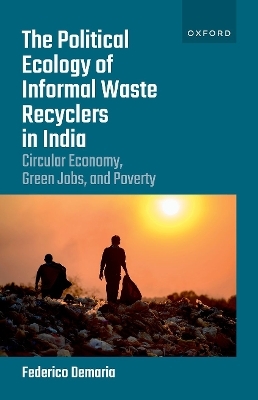
The Political Ecology of Informal Waste Recyclers in India
Oxford University Press (Verlag)
978-0-19-286905-0 (ISBN)
Waste is increasingly a site of social conflict. The questions related to waste management are not merely technical; what, how, where, and by whom become intrinsically political questions. This book is about the power relations in recycling, from the viewpoint of political ecology and ecological economics. Informal waste recyclers are invisible for citizens and public policy. This book focuses on environmental conflicts involving them, with two emblematic case studies from India. Firstly, ship breaking, where the metabolism of a global infrastructure, namely shipping, shifts social and environmental costs to very localized communities in order to obtain large profits. Secondly, the conflict around municipal solid waste management in Delhi shows how environmental costs are shifted to urban residents, and recyclers are dispossessed of their livelihood source: recyclable waste. The first is an example of capital accumulation by contamination, while the second involves both dispossession and contamination. The struggles of informal recyclers constitute an attempt to re-politicize waste metabolism beyond techno-managerial solutions by fostering counter-hegemonic discourses and praxis. The book presents a range of experiences, mostly in India but with examples from all over the world, to inform theory on how environments are shaped, politicized, and contested.
Federico Demaria is an Associate Professor in Ecological Economics and Political Ecology at the University of Barcelona, and a senior researcher at the Institute of Environmental Science and Technology (ICTA), Autonomous University of Barcelona. His research aims to inform theory on how environments are shaped, politicized, and contested. He is an editor of the journal Sustainability Science, and a member of the editorial board of Ecological Economics. He is also an expert reviewer for the Intergovernmental Panel on Climate Change (IPCC). He has been a visiting scholar at research centres in India, China, USA, UK, Netherlands, Croatia, Germany, and Italy. He is the co-editor of Degrowth: A Vocabulary for a New Era (2014) and Pluriverse: A Post-development Dictionary (2019), and a co-author of The Case for Degrowth (2020).
1: Introduction: Waste Is Increasingly a Site of Social Conflict
2: Theoretical Framework: Ecological Economics, Political Ecology, and Waste Studies
3: Shipbreaking in Alang: A Conflict Against Capital Accumulation by Contamination
4: Delhi's Waste Conflict: An Unlikely Alliance Against Capital Accumulation by Dispossession and Contamination
5: Informal Waste Recyclers and Their Environmental Services: A Case for Recognition and Capital De- Accumulation
6: Conclusions: How Environments Are Shaped, Politicized, and Contested
| Erscheinungsdatum | 07.10.2023 |
|---|---|
| Vorwort | Joan Martinez-Alier |
| Verlagsort | Oxford |
| Sprache | englisch |
| Maße | 146 x 223 mm |
| Gewicht | 406 g |
| Themenwelt | Naturwissenschaften ► Biologie ► Ökologie / Naturschutz |
| Sozialwissenschaften ► Soziologie ► Empirische Sozialforschung | |
| Sozialwissenschaften ► Soziologie ► Mikrosoziologie | |
| ISBN-10 | 0-19-286905-1 / 0192869051 |
| ISBN-13 | 978-0-19-286905-0 / 9780192869050 |
| Zustand | Neuware |
| Haben Sie eine Frage zum Produkt? |
aus dem Bereich


